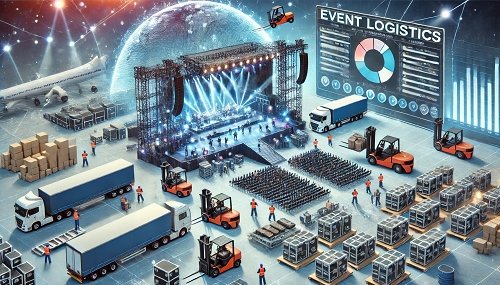By Eva Richardson – The Logistic News, March 20, 2025
The event logistics sector is undergoing a significant transformation, with new research projecting its market value to soar from $125 billion in 2024 to $188 billion by 2032. This expansion, anticipated at a 7.2% compound annual growth rate (CAGR), is being driven by increasing demand for seamless logistical support for large-scale international events.
Key Drivers Behind the Growth of Event Logistics
From corporate summits and global trade shows to international sports tournaments and music festivals, the demand for efficient event logistics solutions is rapidly escalating. This surge can be attributed to several factors:
- Rising Demand for In-Person and Hybrid Events – As organizations expand their reach, logistics providers are required to handle increasingly complex event setups across diverse locations.
- Advancements in Logistics Technology – AI-driven supply chain management, real-time tracking systems, and IoT-enabled automation are reshaping the efficiency of event transportation and planning.
- Sustainability and Green Logistics – With businesses focusing on carbon neutrality, the shift toward eco-friendly transport solutions, recyclable packaging, and emissions reduction initiatives is redefining how event logistics is managed.
- Growth of Sports and Entertainment Events – The increasing number of large-scale sporting tournaments and music festivals is pushing logistics companies to offer scalable, agile solutions tailored to event-specific requirements.
Market Segmentation and Regional Growth Trends
The Event Logistics Market is categorized into four primary service areas:
- Venue Management – Coordinating all logistics related to event locations and infrastructure setup.
- Freight & Transport – Handling the transportation of event materials, staging, and equipment.
- Temporary Infrastructure – Providing temporary structures such as tents, seating, and stages.
- Audio-Visual & IT Support – Managing the transport and setup of digital and AV equipment for seamless event execution.
Regionally, North America remains the most dominant market due to its well-established event infrastructure and high frequency of major international events. However, Asia-Pacific (APAC) is emerging as the fastest-growing region, fueled by the increasing number of mega-events in China, India, and Southeast Asia as well as investments in state-of-the-art event facilities.
Competitive Landscape: Key Players Driving the Industry
The event logistics industry is highly competitive, with leading global firms such as DHL, DB Schenker, XPO Logistics, Kuehne + Nagel, FedEx, UPS, CEVA Logistics, DSV, and Maersk Line investing in technology, acquisitions, and strategic partnerships to strengthen their market share.
“The event logistics market is shifting from basic transportation services to highly sophisticated, tech-enabled solutions,” said a senior logistics executive. “Companies that embrace automation, AI-driven planning, and sustainable logistics strategies will lead the industry’s future.”
Challenges and Future Considerations
Despite strong growth projections, the event logistics industry faces notable challenges, including:
- Supply Chain Disruptions – Global uncertainties, raw material shortages, and fluctuating fuel prices impact logistics efficiency.
- Complex Cross-Border Regulations – Varying regulations across countries present hurdles for international event logistics providers.
- Rising Operational Costs – Increasing labor and transportation costs push logistics firms to optimize routes, improve fleet efficiency, and adopt automation to remain competitive.
The Future of Event Logistics: Innovations and Strategic Adaptation
Looking ahead, automation, AI-powered logistics platforms, and sustainable transport solutions will play a pivotal role in shaping the market. As demand continues to rise, logistics providers must adapt to emerging trends and invest in innovative technologies to remain competitive.
The next decade will witness a paradigm shift in event logistics, where precision, efficiency, and environmental responsibility become key differentiators. Companies that leverage data-driven strategies and customer-centric logistics models will be well-positioned to thrive in an evolving global marketplace.























